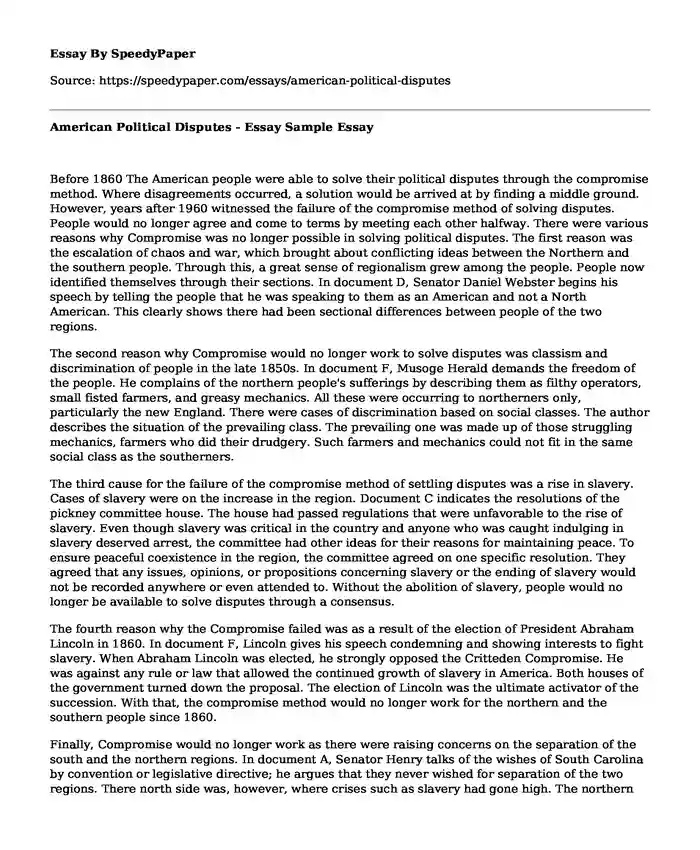
| Type of paper: | Essay |
| Categories: | Politics United States Political science American history |
| Pages: | 3 |
| Wordcount: | 668 words |
Before 1860 The American people were able to solve their political disputes through the compromise method. Where disagreements occurred, a solution would be arrived at by finding a middle ground. However, years after 1960 witnessed the failure of the compromise method of solving disputes. People would no longer agree and come to terms by meeting each other halfway. There were various reasons why Compromise was no longer possible in solving political disputes. The first reason was the escalation of chaos and war, which brought about conflicting ideas between the Northern and the southern people. Through this, a great sense of regionalism grew among the people. People now identified themselves through their sections. In document D, Senator Daniel Webster begins his speech by telling the people that he was speaking to them as an American and not a North American. This clearly shows there had been sectional differences between people of the two regions.
The second reason why Compromise would no longer work to solve disputes was classism and discrimination of people in the late 1850s. In document F, Musoge Herald demands the freedom of the people. He complains of the northern people's sufferings by describing them as filthy operators, small fisted farmers, and greasy mechanics. All these were occurring to northerners only, particularly the new England. There were cases of discrimination based on social classes. The author describes the situation of the prevailing class. The prevailing one was made up of those struggling mechanics, farmers who did their drudgery. Such farmers and mechanics could not fit in the same social class as the southerners.
The third cause for the failure of the compromise method of settling disputes was a rise in slavery. Cases of slavery were on the increase in the region. Document C indicates the resolutions of the pickney committee house. The house had passed regulations that were unfavorable to the rise of slavery. Even though slavery was critical in the country and anyone who was caught indulging in slavery deserved arrest, the committee had other ideas for their reasons for maintaining peace. To ensure peaceful coexistence in the region, the committee agreed on one specific resolution. They agreed that any issues, opinions, or propositions concerning slavery or the ending of slavery would not be recorded anywhere or even attended to. Without the abolition of slavery, people would no longer be available to solve disputes through a consensus.
The fourth reason why the Compromise failed was as a result of the election of President Abraham Lincoln in 1860. In document F, Lincoln gives his speech condemning and showing interests to fight slavery. When Abraham Lincoln was elected, he strongly opposed the Critteden Compromise. He was against any rule or law that allowed the continued growth of slavery in America. Both houses of the government turned down the proposal. The election of Lincoln was the ultimate activator of the succession. With that, the compromise method would no longer work for the northern and the southern people since 1860.
Finally, Compromise would no longer work as there were raising concerns on the separation of the south and the northern regions. In document A, Senator Henry talks of the wishes of South Carolina by convention or legislative directive; he argues that they never wished for separation of the two regions. There north side was, however, where crises such as slavery had gone high. The northern were for the separation. However, the election of Abraham Lincoln saw the succession of the two. The north tried Compromise while the south chose war. Compromises failed to stop the civil war. Before the 19th century, both communities had a common culture and identity as Americans. Over time they later developed different perceptions of what their identities meant. It is at that point where unity began to fade.
Works Cited
"Declaration of the National Anti-Slavery Convention," first annual report of the American Anti-Slavery Society, 1834 Abraham Lincoln, speech at Alton, Illinois, October 15, 1858
Muscogee, Georgia, Herald, quoted in the New York Tribune, September 10, 1856Senator Henry Clay, speech to the Senate, February 12, 1833
Cite this page
American Political Disputes - Essay Sample. (2024, Jan 26). Retrieved from https://speedypaper.net/essays/american-political-disputes
Request Removal
If you are the original author of this essay and no longer wish to have it published on the SpeedyPaper website, please click below to request its removal:
- Essay Sample on American-Soviet Relationship
- Essay Example on the Examining the Activities of the Green Party
- Essay Example on Child Labor
- Essay Example on Bridge Resonance
- Critical Thinking Essay Sample
- The US-Mexico Border and the Trump Wall, Essay Example
- Paper Example: Late Adulthood Development Assessment
Popular categories




